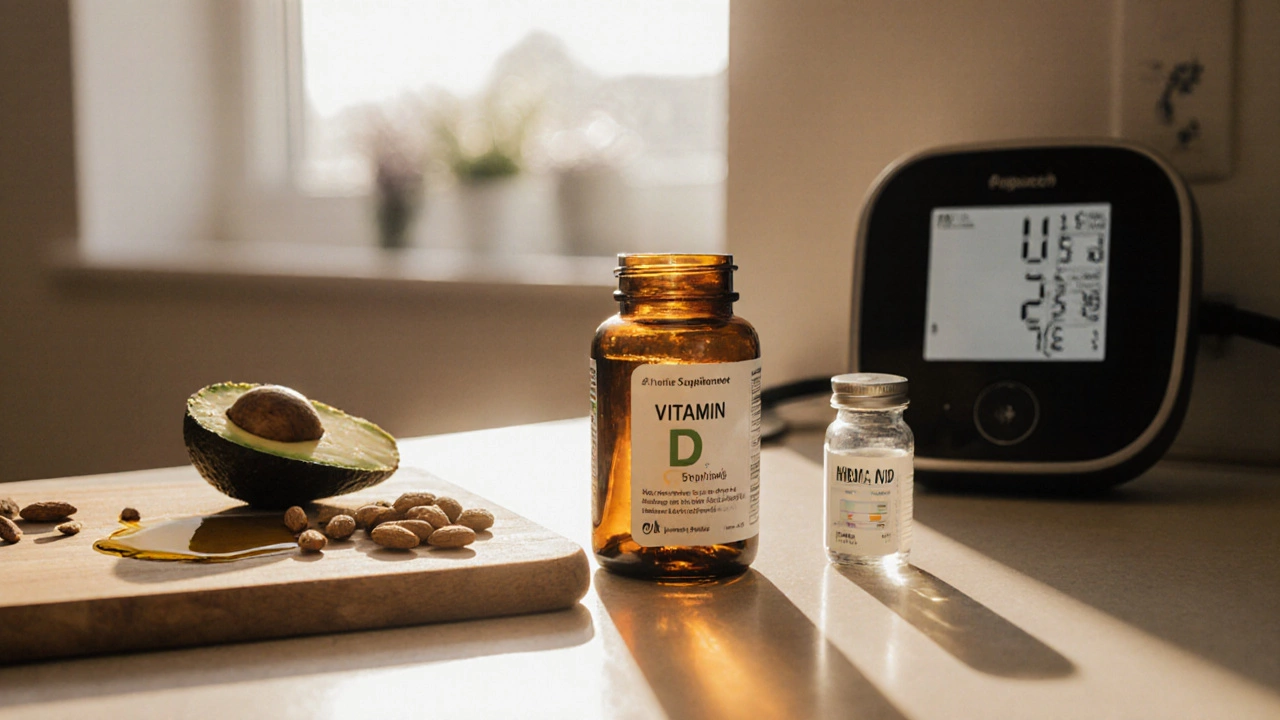-
10

What’s the #1 Supplement to Take? A Practical Guide
Vitamin D Supplement Calculator
Personalize Your Vitamin D Dose
Enter your details below to calculate your recommended daily Vitamin D intake.
Your Recommended Vitamin D Intake
If you’ve ever scrolled through endless supplement aisles wondering which one actually works, you’re not alone. The market is flooded with promises, but science points to a clear front‑runner for most adults. Below you’ll find a straightforward answer, how we got there, and what to do next.
Key Takeaways
- Vitamin D consistently ranks as the #1 supplement for overall health based on wide‑range clinical evidence.
- Choose a dose of 1,000-2,000IU daily if you have limited sun exposure; higher doses may be needed under medical supervision.
- Supporting nutrients - Omega‑3, Magnesium, and Probiotics - complement Vitamin D but aren’t replacements.
- Check for quality certifications (NSF, GMP) and avoid megadoses without a doctor’s advice.
- Regular blood testing helps you fine‑tune your regimen and avoid toxicity.
Why Picking the Right Supplement Matters
Modern diets often fall short of essential micronutrients due to processed foods, indoor lifestyles, and soil depletion. A well‑chosen supplement can fill those gaps, improve immune resilience, and support long‑term vitality. However, misuse - like stacking dozens of pills or exceeding safe limits - can cause more harm than good.
How to Evaluate Any Supplement
Before you trust a label, run it through these three filters:
- Evidence Base: Look for peer‑reviewed studies or meta‑analyses that back the claim.
- Bioavailability: The form matters - for example, methylcobalamin B12 is better absorbed than cyanocobalamin.
- Safety Profile: Check Upper Intake Levels set by health authorities and watch for interactions with medications.
Using this framework, only a handful of nutrients survive the scrutiny.
The #1 Supplement: Vitamin D
When it comes to daily nutrition, Vitamin D is a fat‑soluble vitamin that supports bone health, immune function, and mood regulation. It’s produced in the skin after sunlight exposure, but geographic location, indoor work habits, and sunscreen usage can leave many people deficient.
Research in the Journal of Clinical Endocrinology links adequate Vitamin D levels (30‑50ng/mL serum 25‑OH D) with a 20‑30% lower risk of respiratory infections and a modest reduction in depressive symptoms. Bone density studies consistently show that maintaining sufficient Vitamin D cuts fracture risk by up to 15% in older adults.
If you’re hunting for the best supplement for overall health, Vitamin D tops the list because its benefits span several organ systems while the risk of toxicity remains low when taken within recommended limits.
Recommended daily intake varies:
- Adults with minimal sun: 1,000IU (25µg) daily.
- People over 65 or with known deficiency: 2,000IU (50µg) daily, or higher under doctor supervision.
Common food sources - fatty fish (salmon, mackerel), fortified dairy, and egg yolks - rarely meet needs alone, especially in winter months.
Other Top Contenders Worth Considering
While Vitamin D is the leader, a few other nutrients consistently rank high for complementary benefits. Below is a quick comparison.
| Supplement | Primary Benefits | Typical Daily Dose | Key Food Sources |
|---|---|---|---|
| Omega‑3 Fish Oil | Cardiovascular health, brain function, anti‑inflamatory | 1,000mg EPA+DHA | Salmon, sardines, walnuts |
| Magnesium | Muscle relaxation, sleep quality, blood sugar control | 300‑400mg (as citrate or glycinate) | Spinach, almonds, black beans |
| Probiotic (Lactobacillus+Bifidobacterium) | Gut health, immune modulation, mental health link | 10‑20billion CFU | Yogurt, kefir, fermented veggies |
| Multivitamin | Broad micronutrient coverage, insurance for dietary gaps | One tablet/capsule | Varies by formulation |
These supplements shine in specific scenarios - athletes may benefit from Magnesium for recovery, while gut‑focused individuals might prioritize Probiotics. Yet none demonstrate the same breadth of impact as Vitamin D across bone, immune, and mood pathways.
How to Add Vitamin D (and Friends) to Your Routine Safely
1. Get a baseline test. A simple blood draw measuring 25‑hydroxy Vitamin D tells you where you start.
2. Choose a reputable brand. Look for third‑party verification (NSF, In‑Form) and avoid mega‑doses labeled “super‑strength” unless prescribed.
3. Pair with fat. Vitamin D is fat‑soluble; take it with a meal containing healthy oils (olive oil, avocado) for optimal absorption.
4. Monitor levels. Re‑test after 8-12 weeks; adjust the dose if you’re still below 30ng/mL.
5. Consider synergy. Small amounts of Vitamin K2 (45‑90µg) help direct calcium to bones instead of arteries - a common supplemental combo.

Common Pitfalls & How to Avoid Them
Megadoses without supervision. Taking 10,000IU daily may lead to hypercalcemia, causing nausea, kidney stones, or heart rhythm issues.
Ignoring interactions. Vitamin D can boost calcium absorption, so pairing it with calcium supplements without monitoring can overload the system.
Blindly following trends. Not every “new super‑herb” has rigorous data. Stick to nutrients with a solid research track record.
Quick FAQ
Frequently Asked Questions
How much Vitamin D should I take if I live in Sydney?
Sydney gets plenty of sunshine most of the year, but many adults still fall below optimal levels, especially in winter. A daily dose of 1,000IU is a safe starting point; consider 2,000IU if you spend most time indoors or have a confirmed deficiency.
Can I take Vitamin D with my current medications?
Vitamin D generally interacts minimally, but it can increase calcium levels, affecting thiazide diuretics or calcium channel blockers. Always check with your GP if you’re on heart or bone medications.
Do I need a multivitamin if I take Vitamin D?
A multivitamin can cover micronutrients you might miss, like B‑vitamins or iron. If your diet is balanced and blood work is normal, you may skip it. Prioritize Vitamin D, then assess gaps individually.
What are the signs of Vitamin D deficiency?
Common symptoms include frequent colds, bone or joint pain, fatigue, and mood swings. However, many people feel fine yet still have low blood levels, which is why testing is key.
Is Vitamin D safe for children?
Yes, at age‑appropriate doses (400‑600IU daily). High doses should only be given under pediatric guidance to avoid growth‑plate issues.
Bottom line: for most adults, especially those with limited sun exposure, Vitamin D is the single supplement that delivers the biggest, most well‑rounded health payoff. Pair it wisely with quality Omega‑3, Magnesium, or Probiotics when your lifestyle calls for it, and you’ll have a solid foundation for long‑term wellbeing.